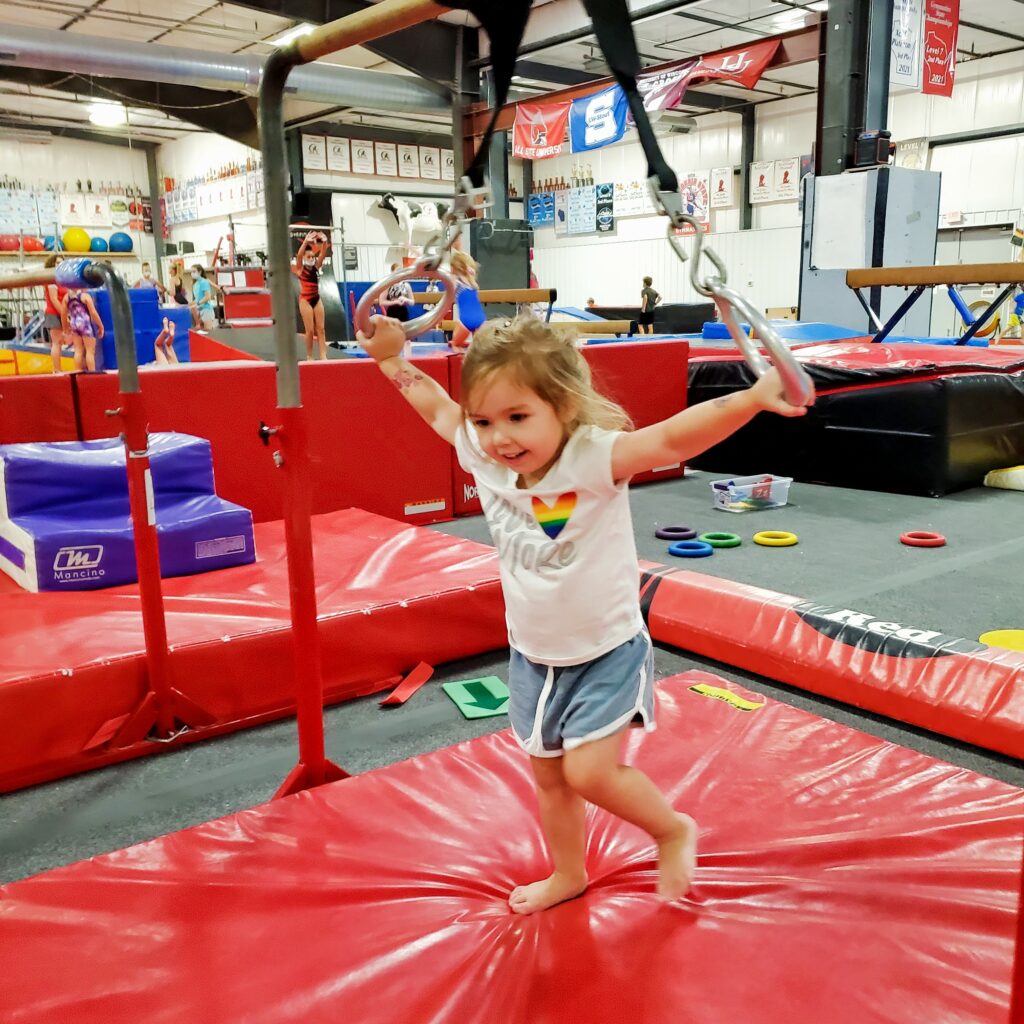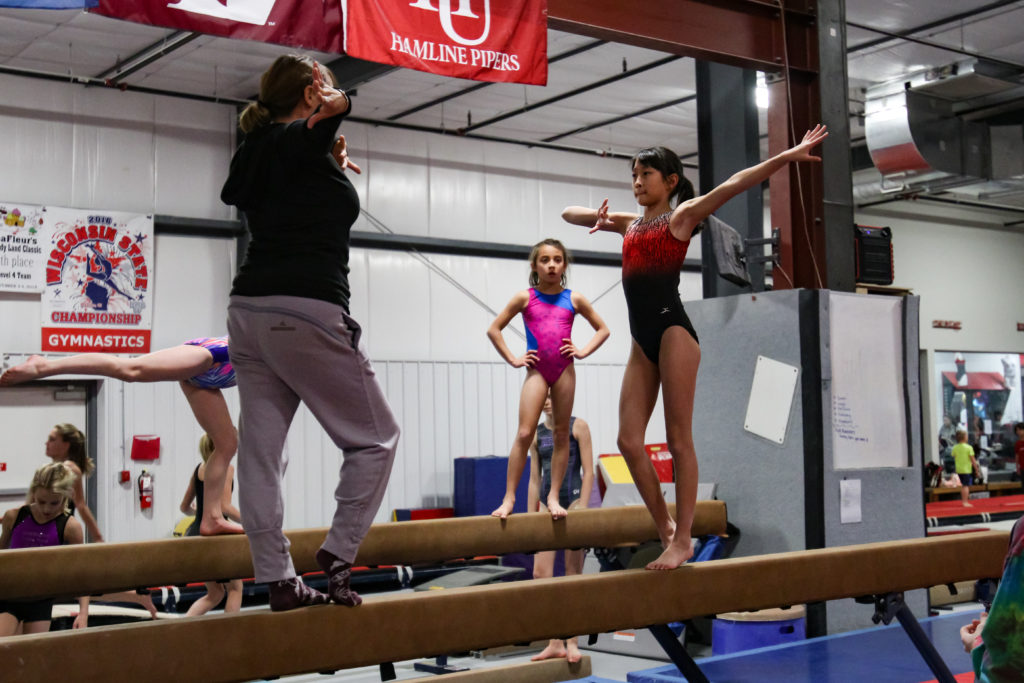Life skills through Gymnastics
This is an article written for Verona Neighbors Magazine. It will appear there in February of 2022.
Physical: building strength, flexibility, cardio health. Cognitive: Strategy, tactics, rules, techniques. Social: teamwork, friendships, learning coping skills. Some of the traits developed by doing sports are well known by parents. Many of us get our kids into sports to develop these characteristics, but often overlooked and undervalued are traits that I know sports can develop. Independence, critical thinking, and leadership skills are often sorely lacking in children as they grow up to be adults. By developing some of the characteristics below, we know that children enhance their self-confidence and show strong qualities of higher-level reasoning and decisiveness.
If the sports program is right, the following landmarks will be developed by practical application in training and in competition or performance. Parents should see each of these displayed as the coach works with the athlete and the athlete participates with the team. Year to year and season to season the athlete maturing in skill and character should be obvious.

Teaching kids about progression
A sport should develop skills in a progressive program with more advanced skills being built upon the more basic ones. In gymnastics we start with donkey kicks or holding their weight on their hands while they kick their feet up and develop that to a handstand. A handstand can become a cartwheel when the child feels comfortable upside down and is ready for another challenge. Cartwheels turn into higher level tumbling skills and can lead to flipping and twisting somersaults and even more. But without beginning, with in this case, a simple Donkey Kick, the progressive climb never starts. When a child understands the concept of progression, they learn that there are basic skills in all things that need to be mastered as a foundation for advancement. Learning scales to play music, memorizing math facts to learn Algebra, or practicing simple vocabulary to master a foreign language are examples of such foundations. Sports can teach kids to love learning, and if we accomplish that, we end up with young adults wanting to learn more and wanting to be better and grow.
Teaching them to be service oriented
Being in sports teaches children that their efforts are for their own development, but also that they work to help the team win and be better. If sports can demonstrate to children that there is a greater cause that we work toward together, then the same philosophy can get children to be service oriented as they grow. Parents often do a great job at getting kids involved in working with or at least recognizing a bigger cause or a community need, but sports can help define what it is to work together for a common goal. Helping each other and having empathy are keys to a civilized society.
Developing coping skills
Gymnastics is a sport of perfection. Kids can do a skill and the judge’s scores reflect performance, form, and execution all in reference to a code of points. The score is almost lower than you want it to be, and that’s OK. The legendary 10.0 is rarely seen, and when it is, it’s due to bonus execution, or composition and not awarded because the routine was perfect. A score either reinforces the gymnast’s training or directs them to change the training plan to eliminate potential future mistakes. These mini “disasters” can help kids develop resiliency. Learning to accept dissatisfaction and looking for the lessons within, is a very valuable skill as it keeps the child forward focused.
Reinforcing responsibility
The lesson of cause and effect is never more apparent for a child than in sports, though it is often presented subtly. If they did not prepare for a particular skill from cartwheel to free throws to batting a ball, they will likely not perform at their desired level of skill. Though a child cannot control their genetics or whether they are enrolled in a great developmental program or a sub-standard one, their effort and attention is completely self-regulated. When a coach calls to their attention that the result was based on effort or the lack of practice, the lesson can sometimes sting. However, those are the lessons that stay with you. At our gym we explain to young gymnasts what will happen if they do a skill with a lack of technique or without proper physical preparation. When they see the result, we reinforce what they are missing, or what they did to be successful. It is invaluable for a child to learn what responsibility they have in directing their own outcomes.
Teaching them to trust and be trustworthy
In an individual sport, like gymnastics (where the athlete performs solo) they know that their performance adds into a team score. They must learn to rely on their teammates to also add into the total to have a good result. In a team sport, this is reinforced even more by building trust in your team to pass the ball or make the shot off your pass. Developing trust in children is not hard. If you help them, they will trust you. But teaching them the value of being trustworthy is a lesson that must be intentional.

Teaching them the value of a balanced life
In our American culture we have forgotten how to lead a balanced life. We are led to believe that we have to work more, sleep less, and that relaxing is for lazy people. With our gym for children we emphasize (particularly with our team kids) that their first priorities are their families and their education. We have had many young go-getters that want to come to the gym 7 days a week in their quest to be the best. But we discourage such participation because they have to allow for rest, recreation, time to enjoy the family relationship, and learn their school lessons. If we can help kids prioritize and balance their activities and lives, we can help them develop healthy lifestyles that they will maintain for a lifetime.
Teaching them to look for adventure
You are always looking for the next skill in gymnastics. In the example of the Donkey Kick above, a student mastering that skill will be ready for more and looks for the next developmental step. As long as they are learning they will be looking forward and developing new skills and a desire for learning more. This love of advancing leads kids to embrace adventure and look forward to trying new skills, exploring new places, trying new things, solving puzzles, and continuing to grow. Not only does this lead to a more fulfilling life but it helps kids grow into people who are not afraid. This again is invaluable in the long term.
It was many years ago that I thought about what my mission was as a coach and in running a gymnastics gym. I of course wanted to train athletes to be the best they could be as gymnasts, but to also have the opportunity to help them grow as happy and healthy adults. This philosophy changed from an ulterior motive to the driving force of our program. All coaches, and all sports, whether intentional or not, will give children the lessons that help them become leaders in the gym, on the field, and in life.

